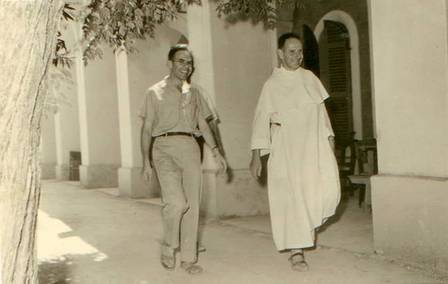Bruno Hussar OP
Father Bruno Hussar, Dominican, was in the first group of founders of the Oeuvre Saint Jacques.

He was born André Hussar in 1911 in a Jewish family living in Alexandria, Egypt. His father was Hungarian and his mother was French, both assimilated Jews. He was educated in French, Italian and English. At the age of eighteen, he, together with his family, arrived in France. He graduated in Paris from the Ecole Centrale as an engineer and during his years of technical studies he also underwent a spiritual conversion. This led to his baptism and his joining the Dominican order in 1945 (taking the name Bruno) and eventually his ordination as a priest in 1950.
In 1953, shortly after taking his final vows, Bruno was sent to Jerusalem by the provincial of the Dominican Order in France, Father Avril, to set up a center for Jewish studies in the young State of Israel. Bruno founded the Maison de Saint Isaïe (Saint Isaiah House) in Jerusalem, a center that was supposed to parallel the prestigious Dominican Center in Cairo, established for the study of Islam. Bruno would encounter numerous difficulties and the center only officially began its work in 1960.
On arriving in Israel, Bruno deepened his understanding of the personal importance of his Jewish roots and his sense of belonging to the Jewish people. Studying Hebrew, Jewish history as well as the attitude of the Church towards the Jews, Bruno became ever more convinced of the necessity to provoke a change in the Church’s teaching and position and in the attitude of Christians. During hios early years, Bruno met up with other Christians of Jewish origin as well as Christians who felt like he did. In 1955, with the birth of the Oeuvre Saint Jacques, Bruno became a pastor of the Hebrew-speaking community in Tel Aviv-Jaffa, where he remained until 1959.
In 1960, he and Father Jacques Fontaine opened the long-planned Isaiah House in Jerusalem and were joined shortly afterrwards by Fathers Marcel Dubois and Gabriel Grossman. With his pastoral insertion in the life of the Hebrew-speaking community as well as in Isaiah House, Bruno became more and more involved in various initiatives to promote dialogue between the Church and the Jews. He was involved in the foundation of the Rainbow Group as well as the Ecumenical Theological Research Fraternity in Israel. Most importantly, Bruno and the Dominican community understood the importance of the Council called by Pope John XXIII. Bruno threw himself into the work of preparing for the Council, lobbying far and wide to have included in the Council a real change in attitude with regard to the Jewish people. Travelling regularly to Rome, Bruno was invited by Cardinal Augustin Bea as an expert to participate in the third séance dedicated to discussing the text that would become Nostra aetate. This text would radically change the official position of the Catholic Church towards Jews and Judaism as well as towards other faiths too.
In 1966 Bruno became an Israeli citizen and the following year, in 1967, he participated in the General Assembly of the United Nations as part of the Israeli delegation. In 1970, Bruno, together with a few friends (including Rina Geftman), founded Neve Shalom (Oasis of Peace), a village dedicated to Arab-Jewish coexistence, situated on the lands of the Trappist monastery at Latroun, half way between Tel Aviv and Jerusalem. At first, Bruno envisioned a community built on a spiritual fraternity shared by Jews, Christians and Muslims. It was part of his great suppleness and generosity of spirit, that he accepted over time that the village be more secular and that the focus be the national (Israeli-Palestinian) rather then the religious divide. Bruno spent the last years of his life travelling between Isaiah House and Newe Shalom.
Bruno published an autobiography which contains not only the story of his life and thought but also important information about the history of the kehilla.
BRUNO HUSSAR, Quand la nuée se levait… témoignage d’un prêtre israélien (Paris, Cerf, 1988).
Bruno passed away in 1996. His gentleness, openness, friendship for all, optimism and vision of a society founded on values of justice and peace are missed still and continue to inspire us.














 The Price of Prime Minister Golda Meir granted to Br Yohanan Elihai
The Price of Prime Minister Golda Meir granted to Br Yohanan Elihai